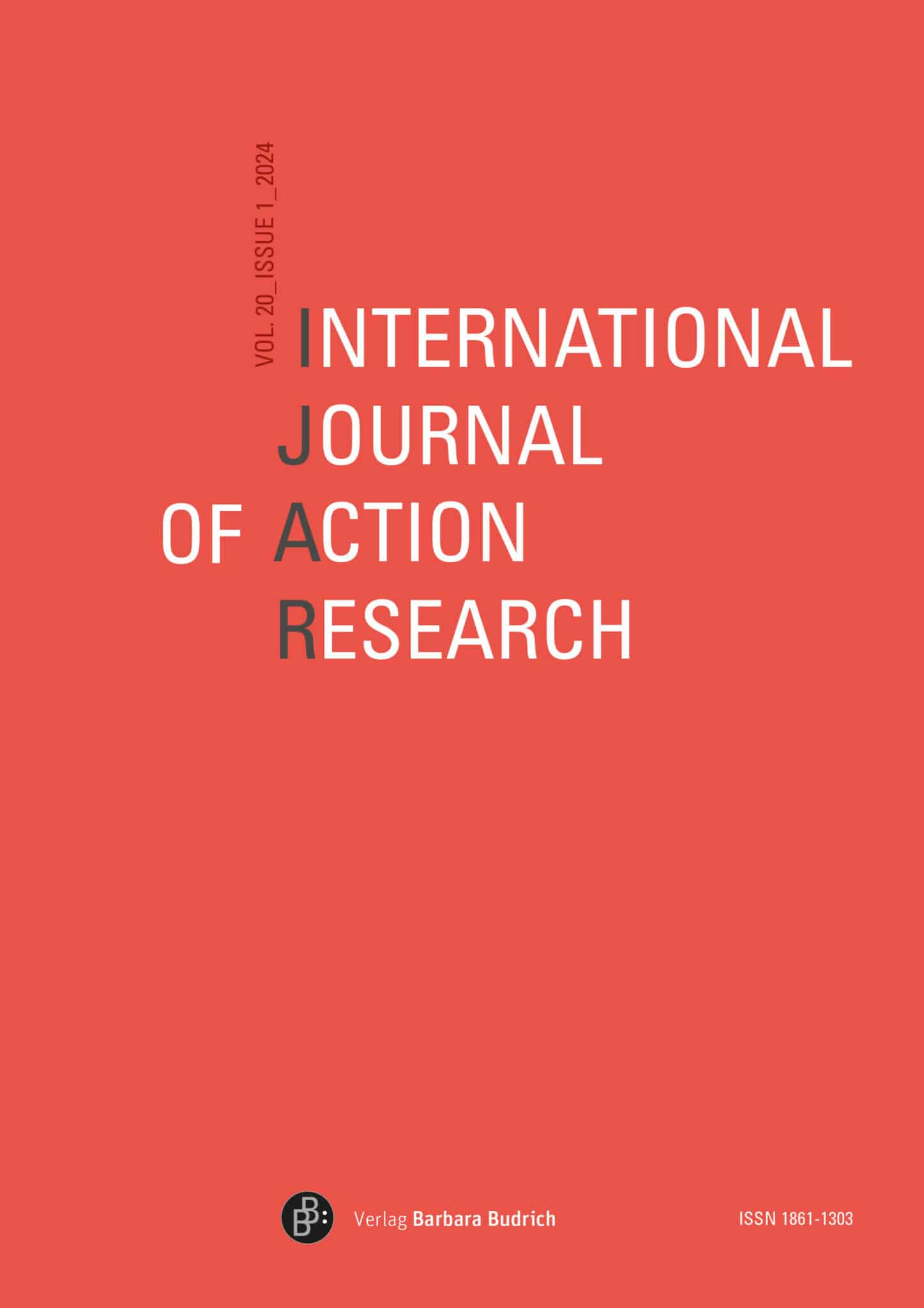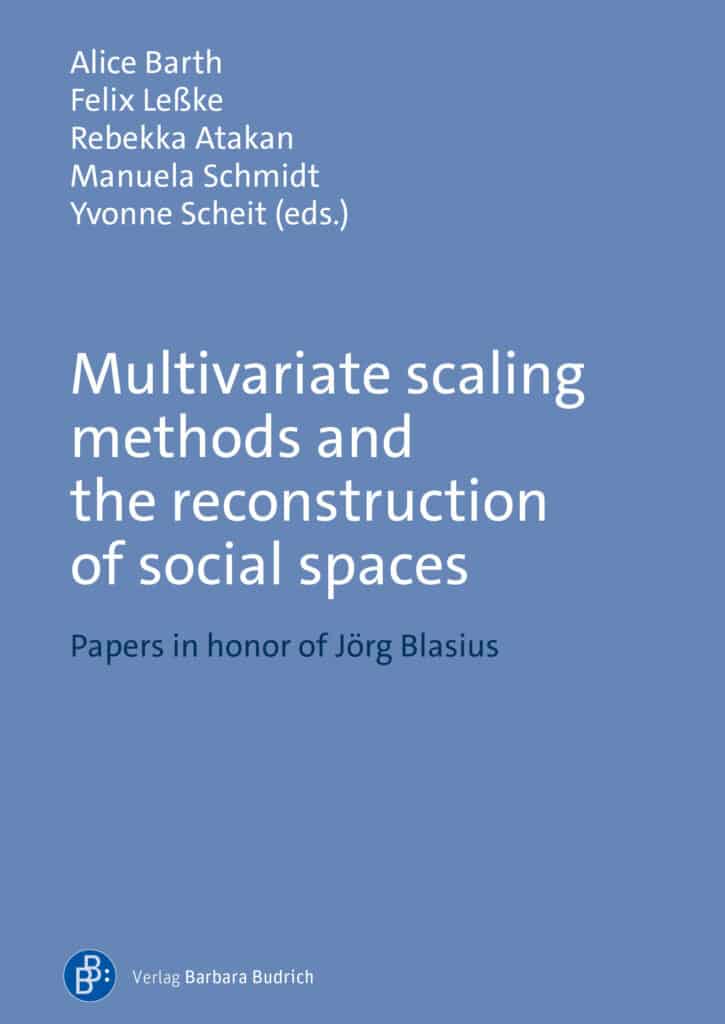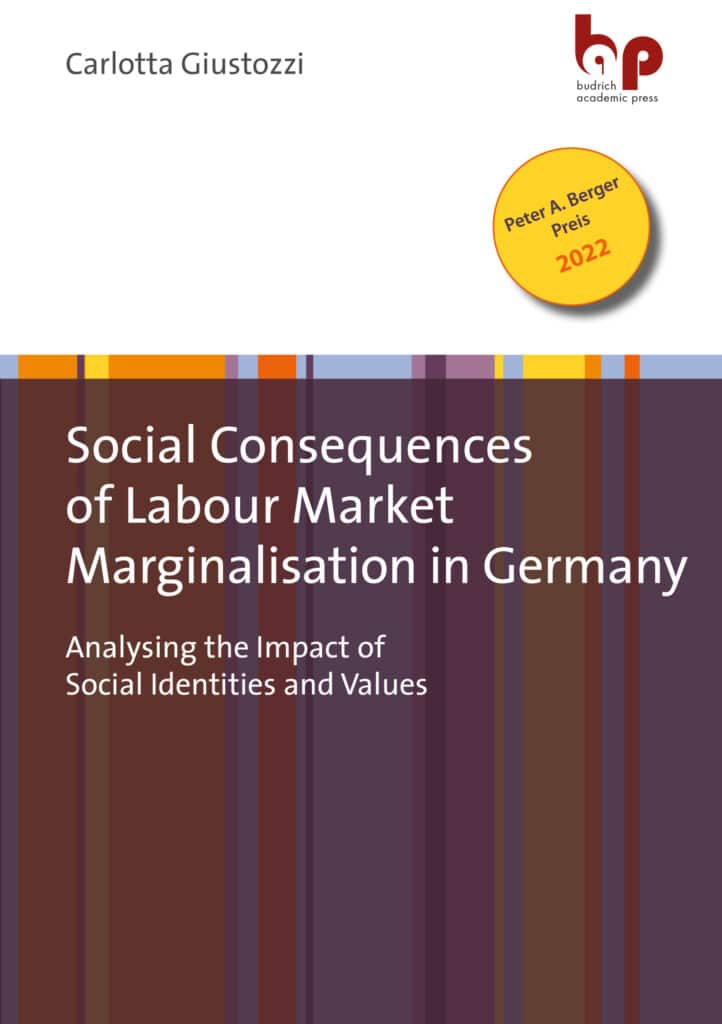Informationen zur Zeitschrift
Home » Publications » IJAR 1-2024 | Free Contributions
IJAR 1-2024 | Free Contributions
Erscheinungsdatum : 08.07.2024
29,00 €
Inhalt
IJAR – International Journal of Action Research
1-2024: Free Contributions
Editorial
Miren Larrea: Health, quality, tangible transformations, and experimentation with aesthetics: diversity and connections within action research
Interview
Lone Hersted / Danilo R. Streck / Miren Larrea: From working with theatre to action research for more regenerative ways of living and organizing: Interview with Lone Hersted
Articles
Mark Howard: Insider action research in palliative care – the challenges of implementing digital health in a hospice organisation in the UK
Mary Casey / Áine Carroll / David Coghlan / Diarmuid Stokes: Appraising Quality in Action Research in Healthcare Settings
Isabel Heck: From Participatory Research to the Co-construction of Actions – Reflections on how to Reinforce Action Research for Social Inclusion
Aina Landsverk Hagen / Sara Berge Lorenzen: Chasing balloons as scientific practice: On transformative co-creation and epistemic ethics of care in the emerging field of youth citizen social science
Book Review
Carolina Schenatto da Rosa / Danilo R. Streck / Richard Ennals: Ausi Told Me: (Re)inventing Action Research from South African Tradition
Download of single articles (Open Access/fee-based): ijar.budrich-journals.com
You can register here for the IJAR alert.
Einzelbeitrag-Download (Open Access/Gebühr): ijar.budrich-journals.com
Sie können sich hier für den IJAR-Alert anmelden.
Zusätzliche Informationen
| Publisher | |
|---|---|
| ISSN | 1861-1303 |
| eISSN | 1861-9916 |
| Volume | 20. Jahrgang 2024 |
| Edition | 1-2024 |
| Date of publication | 08.07.2024 |
| Scope | 104 Seiten |
| Language | Englisch |
| Format | 17 x 24 cm |
| DOI | |
| Homepage |
Additional Content
Table of Contents / Inhaltsverzeichnis
Extracts / Leseproben
Autor*innen
Keywordsaction research, Canada, citizen social science, co-construction, co-creation, digital health, ethics of care, healthcare, identity, insider action research, Juli 2024, Montreal, palliative care, quality factors in action research, reflective practice, scoping review, social change, social inclusion, youth
Abstracts
Insider action research in palliative care – the challenges of implementing digital health in a hospice organisation in the UK (Mark Howard)
This paper describes the first-person experience of being a medical consultant and novice action researcher in a UK hospice setting. A new digital IT system resulted in unexpected changes to productivity. An action research methodology using cycles of co-operative inquiry with hospice staff was chosen to investigate. The new technology caused fears among hospice nurses that the authenticity of the hospice ethos would be lost. The hospice staff were concerned about the loss of their role and identity. Action cycles were used to positively transform the hospice nursing structure and admission process. Keywords: insider action research, palliative care, digital health, identity
» Buy Single Contribution (Budrich Journals) / Einzelbeitrag kaufen (Budrich Journals)
Appraising Quality in Action Research in Healthcare Settings (Mary Casey, Áine Carroll, David Coghlan, Diarmuid Stokes)
Criteria for establishing the quality of action research is of increasing interest to researchers and practitioners however, it is not known how well these criteria are used. This review addresses this issue by appraising extant measures that assess quality in action research. Taking Coghlan and Shani’s (2014, 2018) four quality factors: context, quality of relationships, quality of the action process and outcomes, this scoping review examines if and how these factors have featured as quality criteria. While all studies included in this review reported on the four quality factors, no study reported in any detail on how any of the factors were integrated with one another. Findings therefore highlight a significant gap in the monitoring and reporting on the quality of action research studies. Addressing these gaps will support the development of future action research aimed at mitigating the lack of quality associated with action research approaches. Keywords: Quality factors in action research; healthcare, scoping review
» Buy Single Contribution (Budrich Journals) / Einzelbeitrag kaufen (Budrich Journals)
From Participatory Research to the Co-construction of Actions – Reflections on how to Reinforce Action Research for Social Inclusion (Isabel Heck)
An important part of the action research literature focuses on the participatory dimension of the research process and is much less explicit on the connection of research and action or on how researchers contribute to tangible transformations, in particular outside organizational or education settings. Drawing from seven years of experience as an action researcher within an anti-poverty organization dedicated to improving living conditions in a low-income neighborhood in Montreal (Canada), this article seeks to enhance our comprehension of how action researchers can more effectively contribute to transformational action. Our study identifies four primary functions of research within the examined model and underscores three core characteristics to strengthen the integration of knowledge production and action. These characteristics encompass expanding the role of researchers to actively participate in both the co-development and implementation of action; engaging in long-term commitments and partnerships in a given setting, preferably being even a researcher based in the setting; and fostering collaborations with universities. By elucidating these key elements, this article intends to offer insights into improving the impact of action research, ultimately advancing our ability to contribute to transformative change for more inclusive and sustainable societies. Keywords: Action research, co-construction, reflective practice, social change, social inclusion, Montreal, Canada
» Buy Single Contribution (Budrich Journals) / Einzelbeitrag kaufen (Budrich Journals)
Chasing balloons as scientific practice: On transformative cocreation and epistemic ethics of care in the emerging field of youth citizen social science (Aina Landsverk Hagen, Sara Berge Lorenzen)
How does including youth in research within a citizen social science framework challenge and transform our participatory action research practices and approaches? Through a storying journey we unravel how the training and subsequent conducting of a co-creative research process with young citizen social scientists are evolving from a cacophony of traditions, approaches and disciplines, among them youth participatory action research, action research in organizations, citizen science and social anthropology. The article is based on empirical research with a group of young people in Oslo, Norway, involved in a large collaborative citizen social science project on social inclusion of youth in Europe. We have witnessed closely how an epistemic ethics of care is integral to securing the epistemic justice of youth and argue that citizen social science can promote both epistemic justice and epistemic abundance by including youth in all parts of a rigorous research process that produces new scientific knowledge. Yet, we found that performing an ethics of care is (close to) impossible within the current conditions and structures of social sciences, as our ideals and views on what science is, delimit the practices of relational care necessary for inclusive processes. The implications of our findings call for an ethics of care framework for both citizen social science and action research practices. Key words: Youth, ethics of care, citizen social science, action research, co-creation
» Buy Single Contribution (Budrich Journals) / Einzelbeitrag kaufen (Budrich Journals)
Inhalt
Inhalt
IJAR – International Journal of Action Research
1-2024: Free Contributions
Editorial
Miren Larrea: Health, quality, tangible transformations, and experimentation with aesthetics: diversity and connections within action research
Interview
Lone Hersted / Danilo R. Streck / Miren Larrea: From working with theatre to action research for more regenerative ways of living and organizing: Interview with Lone Hersted
Articles
Mark Howard: Insider action research in palliative care – the challenges of implementing digital health in a hospice organisation in the UK
Mary Casey / Áine Carroll / David Coghlan / Diarmuid Stokes: Appraising Quality in Action Research in Healthcare Settings
Isabel Heck: From Participatory Research to the Co-construction of Actions – Reflections on how to Reinforce Action Research for Social Inclusion
Aina Landsverk Hagen / Sara Berge Lorenzen: Chasing balloons as scientific practice: On transformative co-creation and epistemic ethics of care in the emerging field of youth citizen social science
Book Review
Carolina Schenatto da Rosa / Danilo R. Streck / Richard Ennals: Ausi Told Me: (Re)inventing Action Research from South African Tradition
Download of single articles (Open Access/fee-based): ijar.budrich-journals.com
You can register here for the IJAR alert.
Einzelbeitrag-Download (Open Access/Gebühr): ijar.budrich-journals.com
Sie können sich hier für den IJAR-Alert anmelden.
Bibliography
Zusätzliche Informationen
| Publisher | |
|---|---|
| ISSN | 1861-1303 |
| eISSN | 1861-9916 |
| Volume | 20. Jahrgang 2024 |
| Edition | 1-2024 |
| Date of publication | 08.07.2024 |
| Scope | 104 Seiten |
| Language | Englisch |
| Format | 17 x 24 cm |
| DOI | |
| Homepage |
Produktsicherheit
Additional Content
Additional Content
Table of Contents / Inhaltsverzeichnis
Extracts / Leseproben
Bewertungen (0)
Bewertungen
Es gibt noch keine Bewertungen.
Authors
Autor*innen
Tags
Keywordsaction research, Canada, citizen social science, co-construction, co-creation, digital health, ethics of care, healthcare, identity, insider action research, Juli 2024, Montreal, palliative care, quality factors in action research, reflective practice, scoping review, social change, social inclusion, youth
Abstracts
Abstracts
Insider action research in palliative care – the challenges of implementing digital health in a hospice organisation in the UK (Mark Howard)
This paper describes the first-person experience of being a medical consultant and novice action researcher in a UK hospice setting. A new digital IT system resulted in unexpected changes to productivity. An action research methodology using cycles of co-operative inquiry with hospice staff was chosen to investigate. The new technology caused fears among hospice nurses that the authenticity of the hospice ethos would be lost. The hospice staff were concerned about the loss of their role and identity. Action cycles were used to positively transform the hospice nursing structure and admission process. Keywords: insider action research, palliative care, digital health, identity
» Buy Single Contribution (Budrich Journals) / Einzelbeitrag kaufen (Budrich Journals)
Appraising Quality in Action Research in Healthcare Settings (Mary Casey, Áine Carroll, David Coghlan, Diarmuid Stokes)
Criteria for establishing the quality of action research is of increasing interest to researchers and practitioners however, it is not known how well these criteria are used. This review addresses this issue by appraising extant measures that assess quality in action research. Taking Coghlan and Shani’s (2014, 2018) four quality factors: context, quality of relationships, quality of the action process and outcomes, this scoping review examines if and how these factors have featured as quality criteria. While all studies included in this review reported on the four quality factors, no study reported in any detail on how any of the factors were integrated with one another. Findings therefore highlight a significant gap in the monitoring and reporting on the quality of action research studies. Addressing these gaps will support the development of future action research aimed at mitigating the lack of quality associated with action research approaches. Keywords: Quality factors in action research; healthcare, scoping review
» Buy Single Contribution (Budrich Journals) / Einzelbeitrag kaufen (Budrich Journals)
From Participatory Research to the Co-construction of Actions – Reflections on how to Reinforce Action Research for Social Inclusion (Isabel Heck)
An important part of the action research literature focuses on the participatory dimension of the research process and is much less explicit on the connection of research and action or on how researchers contribute to tangible transformations, in particular outside organizational or education settings. Drawing from seven years of experience as an action researcher within an anti-poverty organization dedicated to improving living conditions in a low-income neighborhood in Montreal (Canada), this article seeks to enhance our comprehension of how action researchers can more effectively contribute to transformational action. Our study identifies four primary functions of research within the examined model and underscores three core characteristics to strengthen the integration of knowledge production and action. These characteristics encompass expanding the role of researchers to actively participate in both the co-development and implementation of action; engaging in long-term commitments and partnerships in a given setting, preferably being even a researcher based in the setting; and fostering collaborations with universities. By elucidating these key elements, this article intends to offer insights into improving the impact of action research, ultimately advancing our ability to contribute to transformative change for more inclusive and sustainable societies. Keywords: Action research, co-construction, reflective practice, social change, social inclusion, Montreal, Canada
» Buy Single Contribution (Budrich Journals) / Einzelbeitrag kaufen (Budrich Journals)
Chasing balloons as scientific practice: On transformative cocreation and epistemic ethics of care in the emerging field of youth citizen social science (Aina Landsverk Hagen, Sara Berge Lorenzen)
How does including youth in research within a citizen social science framework challenge and transform our participatory action research practices and approaches? Through a storying journey we unravel how the training and subsequent conducting of a co-creative research process with young citizen social scientists are evolving from a cacophony of traditions, approaches and disciplines, among them youth participatory action research, action research in organizations, citizen science and social anthropology. The article is based on empirical research with a group of young people in Oslo, Norway, involved in a large collaborative citizen social science project on social inclusion of youth in Europe. We have witnessed closely how an epistemic ethics of care is integral to securing the epistemic justice of youth and argue that citizen social science can promote both epistemic justice and epistemic abundance by including youth in all parts of a rigorous research process that produces new scientific knowledge. Yet, we found that performing an ethics of care is (close to) impossible within the current conditions and structures of social sciences, as our ideals and views on what science is, delimit the practices of relational care necessary for inclusive processes. The implications of our findings call for an ethics of care framework for both citizen social science and action research practices. Key words: Youth, ethics of care, citizen social science, action research, co-creation
» Buy Single Contribution (Budrich Journals) / Einzelbeitrag kaufen (Budrich Journals)









Bewertungen
Es gibt noch keine Bewertungen.